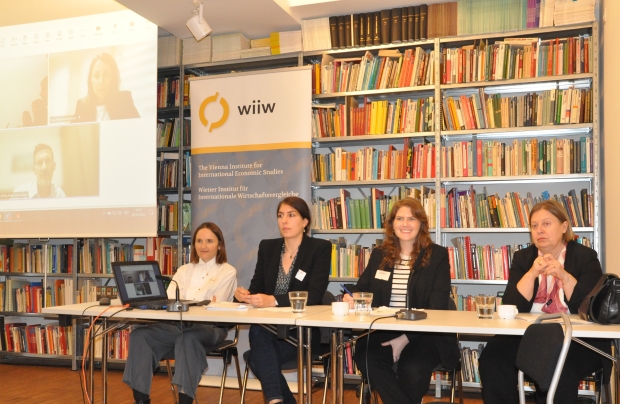Network for tobacco taxation in Eastern Europe meets in Vienna for high-level exchange
13 November 2025
The wiiw Health Economics and Policy Analysis team met for a dialogue with experts – including representatives from Johns Hopkins University, the World Bank and the OECD – on the latest research findings and policy measures on tobacco taxation in Eastern Europe
image credit: wiiw/Andreas Knapp
By Kristijan Fidanovski, Biljana Jovanovikj and Nora Kungl
On 28-29 October 2025, the Health Economics and Policy Analysis team at the Vienna Institute for International Economic Studies (wiiw-HEPA) hosted the biannual workshop of the Tobacco Taxation in Eastern Europe research network.
The network, now in its second year, was established and is co-managed by wiiw researchers Nora Kungl, Biljana Jovanovikj and Kristijan Fidanovski, with the support of Senior Research Associate Hana Ross. It brings together research institutions from eight Central and Eastern European (CEE) countries:
Bulgaria (Institute for Economic Studies), Georgia (FCTC Implementation and Monitoring Center in Georgia), Kosovo (Riinvest), Poland (Institute for Structural Research), Romania (Aspen), Serbia (Institute for Economic Sciences), Turkey (Marmara University) and Ukraine (Kyiv School of Economics and Centre for Economic Strategy).
The workshop served a dual purpose: to review the preliminary results of new studies launched earlier this year (Tobacco workshop - May 2025), and to exchange experiences on organising successful policy events aimed at translating research findings into effective public policies. A special feature of this meeting was the fact that researchers from several other CEE countries who are involved in the Johns Hopkins University-led partner network Economics for Health also joined the discussions to share their regional perspectives.

credit: wiiw/Andreas Knapp
Over two days, participants explored four key research themes: tax modelling and policy action, illicit trade trends in the region, the use and characteristics of novel tobacco products, and the impact of tobacco spending on other types of household consumption. In addition to the technical component, the second part of the event featured a panel on ways to bridge the gap between research and policy making. Representatives from Economics for Health, the World Bank and the OECD shared their experiences with communicating evidence to policy makers and promoting data-driven decision making. The workshop concluded with an interactive session that allowed participants to reflect on their experiences, share challenges, and discuss ideas for strengthening collaboration with policy makers.
Drawing on the knowledge exchanged at this workshop, wiiw-HEPA and its country partners will be releasing the presented studies over the coming months. This comes at a pivotal moment for tobacco control in Europe, as the European Union is in the process of revising its 2011 Tobacco Tax Directive (TTD) on manufactured cigarettes and extending it to alternative tobacco and nicotine products. As EU legislation sets the tone for its member states (as well as for current and prospective candidate countries), generating robust evidence on the fiscal and health implications of tobacco taxation is more important than ever.
The Tobacco Taxation in Eastern Europe research network is part of the Bloomberg Initiative to Reduce Tobacco Use, which is supported by Bloomberg Philanthropies.
